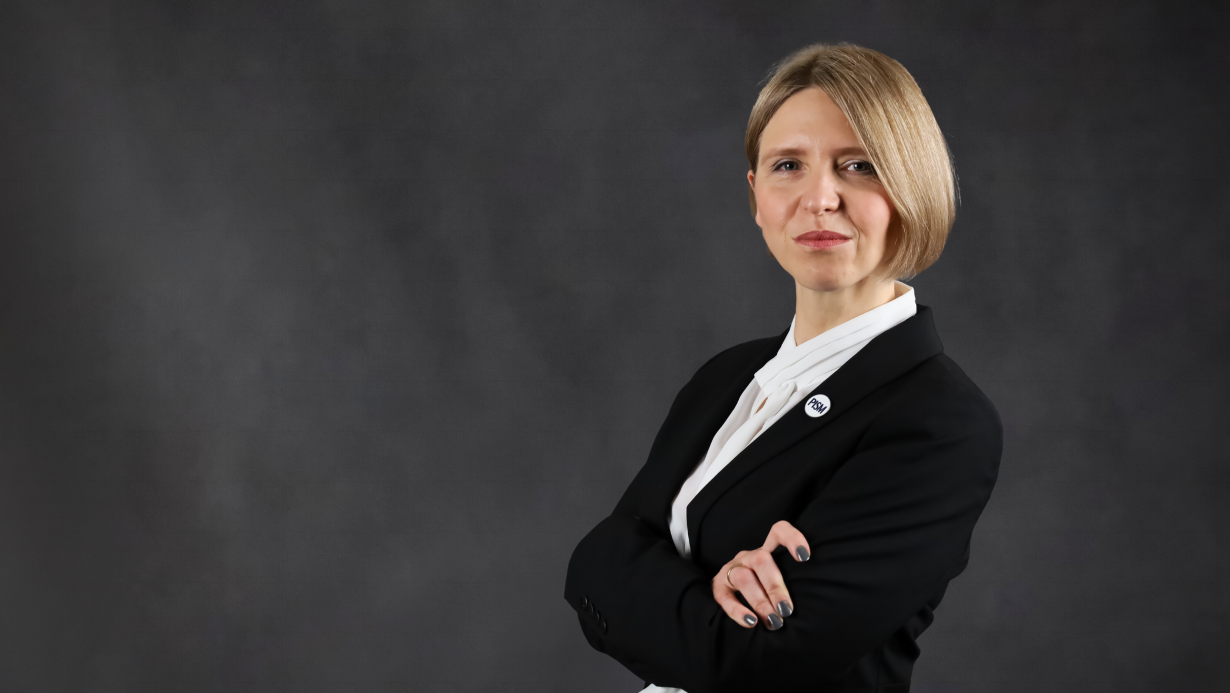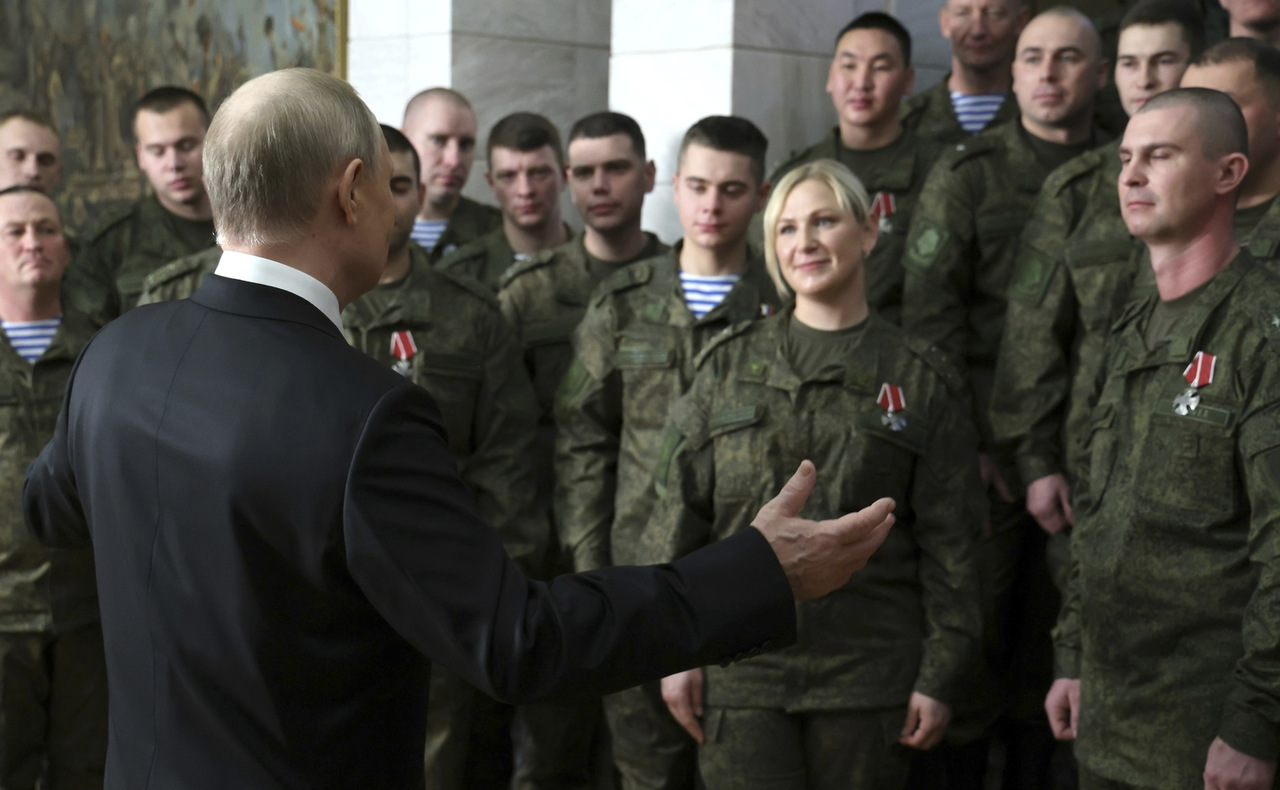One Year After the Invasion: Most Russians Still Back War in Ukraine
One year on from the invasion of Ukraine, Russian society is largely supportive of the war, although the authorities are finding it difficult to mobilise citizens. The passivity and adaptability of Russians means that the regime does not have to fear mass protests. The power elite is so far loyal to Vladimir Putin. Although they have been restricted in their ability to earn legally in the West, they are compensating for their losses in the occupied areas of Ukraine. Since Putin does not have to worry about internal problems, he can focus on a long-term confrontation with the West and continue the war against Ukraine.
.jpg) Vlad Karkov / Zuma Press / Forum
Vlad Karkov / Zuma Press / Forum
Russians’ Attitude to the War
The Russian public mostly supports the war against Ukraine, although in an authoritarian state, the exact scale of this support is difficult to estimate. According to research by the independent Levada Centre, the level of approval remains stable at 70-75%. The part of the public that most actively supports the war—self-described “Z-patriots” (from the Latin letter “Z” used by the Russian military in Ukraine)—comprises about 20-25% of the population. The minority who actively opposed the war from the beginning of the invasion have either been pacified (some 20,000 people have been detained to date, according to data from OVD-Info, a media project defending human rights in Russia) and are serving heavy sentences in penal colonies. Those who did not want to go to the front have left Russia (more than a million people). The rest of the Russian public has adapted to the situation, choosing individual survival strategies.
Russians’ support for the war is mainly passive in nature. There is little enthusiasm for the ongoing military action in Ukraine comparable to the exuberant expressions over the annexation of Crimea in March 2014. Last September’s decision to incorporate four Ukrainian regions into the Russia (the so-called “People’s Republics”) interested only 7% of Russians, according to the Levada Centre. Many of the initiatives promoting the war are directed by the authorities and mostly take place in the provinces. Last September, the Russian authorities were forced to carry out a partial mobilisation, which proved unpopular. Almost half of Russians surveyed disapproved of it. Although the state administration coped with the partial mobilisation order, it resulted in citizen resentment towards the authorities. After a year of war, though, there is no visible pessimistic mood amongst the public (i.e., “war fatigue”); rather, declarations of support for the authorities’ drive for victory prevail. According to a Levada survey from February this year. Russians are most likely to declare “pride in their nation” (35%) and “hope” (30%).
Reasons for supporting the War and the Potential for Protests
Putin’s decision to wage war in Ukraine is perceived by the Russian public as necessary for reasons of state security, over which they—i.e., ordinary citizens—have no influence. The war, which is portrayed in pro-government propaganda as a confrontation between Russia and the West (primarily with NATO and the United States), has reinforced Russians’ impression of insecurity and the “besieged fortress” syndrome (a sense of imminent threat from an external enemy). The Russian government’s references to the symbolism of the Great Patriotic War instils pride among Russians in the Soviet victory during World War II, followed by the dehumanisation of Ukrainians by calling them “Nazis”.
After a year of war, the Russian authorities do not fear citizen-led opposition to the ongoing military operations in Ukraine. The passivity and apathy of Russian society and repression of activists and independent journalists (blocking of independent media, including 20,000 websites) enable those in power to continue the war. Propaganda plays an important role in agitating public support for the war (described by the Russian government as a special military operation). The greatest support for the war is found in the older generation, among those over 55, who get most of their news from pro-Kremlin television. The scale of combat losses at the front on the Russian side does not penetrate the public consciousness. According to Ukrainian data, they amount to around 171,000 killed or injured, but such heavy losses has not lead to a reduction in support for Putin.
In the major cities, where the largest protests took place, the authorities are taking care to ensure that war-related symbols do not appear in the public space, there are plenty of products in the shops, and Western goods have been replaced by Chinese, Turkish, or illegally imported Western goods. In order not to alarm the population, the mayor of the capital, Sergei Sobyanin, was the first to end the partial mobilisation in Moscow (even before Putin’s decision for the whole country).
In smaller towns and in the provinces (where Russians are 100 times more likely to be sent to the front), the potential for protest is lower due to the difficult living situation. Earnings from participation in the war are attractive and encourage people to join the army. Soldiers on contract earn on average 10 times Russia’s minimum wage—about RUB 300,000 ($3,800)—if they die during their service, the family can expect to receive about RUB 3 million ($38,000). Additional benefits of sending a family member to the military include loan waivers from banks or preferences for children in nurseries and kindergartens.
The Power Elite in the Face of the War
Putin has managed so far to maintain the loyalty of the power elite, which takes active part in the implementation of aggressive state policy. This is due not so much to a belief in Russia’s victory in Ukraine as to an assumption of the possibility of achieving at least limited tactical goals (preservation of Crimea and new territorial gains). The lack of opposition to Putin is linked to the fear of losing their position in the circle of power, the need for personal security, and the fear of even greater losses if the Putin system collapses. At the start of the Russian invasion, the founder of aluminium conglomerate Rusal, the oligarch Oleg Deripaska, spoke out against the war on several occasions, unsuccessfully hoping for an easing of U.S. and British sanctions. Oligarch Roman Abramovich, on the other hand, tried mediating between Ukrainians and Russians, hoping for the easing of personal sanctions.
The Russian president is trying to compensate loyal politicians and oligarchs by creating opportunities to raise money from the “reconstruction” of occupied territories or from arms contracts. However, they are unable to cover the losses resulting from the loss of contacts with the West (opportunities to make and keep money there, secure a future for themselves and their families, and access to luxuries). However, as the prolonged war in Ukraine offers no chance of Western sanctions being lifted anytime soon, the elites are faced with a choice between accepting Putin’s policies or emigrating, as Anatoly Chubais, the author of Russia’s privatisation and another oligarch, has done. Most elites are trying to redirect their savings to Dubai in the United Arab Emirates.
Conclusions and Recommendations
The authoritarian regime in Russia is ready for a prolonged war on Ukrainian territory because the cost to the elite and society is relatively small. After a year of war campaigning, most Russians have adjusted to the situation. In smaller towns and in the provinces, support for the war is a product of the deteriorating material situation, effective propaganda and the material dependence of the population on the state. Working in the budgetary sphere is, like the army, a path to social advancement, allowing a family to secure its livelihood (even at the cost of its members’ lives). Although Russian society is not as mobilised for the struggle as Putin expects, it is too passive and apolitical to resist the orders of power. Mobilisation is not evenly distributed geographically, but for the time being there are no separatist tendencies in the regions. It is in the interests of local authorities and residents to maintain a strong central authority, as the regions are dependent on it for policing and funding.
Russian attitudes to the war may change if the Russian army faces defeat on the Ukrainian front and, above all, if Ukraine recaptures Crimea. This, though, will reinforce the public’s confrontational attitude towards the U.S., as well as towards so-called unfriendly states, such as Poland. Defeats on the front will force another mobilisation (with recruits coming from smaller towns and provinces). This may trigger local protests, for which the law enforcement services are prepared, but if among the generals and the power elite, it will damage the image of a victorious president.
For this reason, a key way to change the attitude of Russian society towards the war, and the consequent loss of legitimacy by the Kremlin authorities, will be for the West to continue to support Ukraine militarily and financially. Public attitudes will change as Russia’s economic situation deteriorates and also under the influence of symbolic actions, such as the exclusion of Russian athletes from Olympic activities.





.jpg)